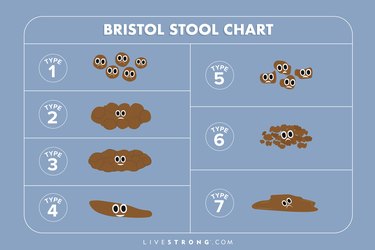
Gut health is a buzzy topic these days, but there's good reason for that: Not only does your GI tract digest and absorb the nutrients that give your body energy, it's also key to keeping you healthy.
"The gut is filled with trillions of good microorganisms, which play an important role in maintaining a healthy immune system," Benjamin Hyatt, MD, gastroenterologist at Middlesex Digestive Health and Endoscopy Center in Acton, Massachusetts, tells LIVESTRONG.com.
Video of the Day
Video of the Day
Doctors are also exploring something known as the gut-brain connection, or how our digestive systems are linked to our mental and emotional as well as physical health.
"To put it simply, our GI tract is sensitive to all types of emotion — anxiety, sadness, anger, elation," says Janelle Thompson, PsyD, a clinical health psychologist and assistant professor at the University of Arizona in Tucson who specializes in gastrointestinal diseases. "A clear example of this is the nausea or intestinal discomfort that many people feel before giving a presentation."
Like other areas of health, such as heart health, gut health has some genetic components, per an April 2020 study in BMC Microbiome. But lifestyle habits also play a role, notes Bryan Curtin, MD, a gastroenterologist at Mercy Medical Center in Baltimore, Maryland.
"Good dietary habits, exercise and keeping a healthy weight are all ways to keep your gut in good working order," he says.
Here's a closer look at some of the everyday things gastroenterologists do to support their gut health.
1. They Keep a Journal of Their Bathroom Behavior
Though it might not be the most appealing to-do on your list, Rabia A. De Latour, MD, gastroenterologist at NYU Langone Health in New York City, recommends keeping tabs on the frequency and appearance of your stools to get a better idea of where your gut health stands.
"The shape, consistency, texture and color of your poop reveals a lot about what is going on in your gut," she says.
She recommends using the Bristol Stool Chart, which breaks down stool into seven different types:

Types 3 and 4 are ideal poop shapes, while types 1 and 2 generally mean you're constipated, and types 5, 6 and 7 are loose stools or diarrhea.
If you notice a change in the appearance of your stools, and especially if you have any other symptoms — like abdominal pain or weight loss — make an appointment for a gut checkup.
2. They Keep Stress in Check

Stress-reduction tactics can help reduce symptoms of GI diseases and even prevent them from developing or getting worse, Dr. Hyatt says.
"Chronic stress has a negative impact on the gastrointestinal tract by causing alterations to the communication between the gut and brain," he says. "These alterations may worsen or lead to development of many GI conditions including irritable bowel syndrome, inflammatory bowel disease and gastroesophageal reflux disease."
He recommends doing stress-reducing activities regularly, such as exercise, yoga, meditation or hypnotherapy.
Start Here
3. They Stay Hydrated
Seeing as the human body is made up of about 60 percent water, per the United States Geological Survey, it's no surprise that staying hydrated plays a crucial role in maintaining gut health.
The gut needs water to function and allow for a healthy balance of good bacteria in the intestinal tract, explains Dr. Curtin.
"Like a car engine needs oil, your gut needs water — otherwise you risk becoming constipated," he says.
He recommends drinking at least two liters of water a day to stay hydrated and keep your GI system running smoothly (that's about 8.5 cups).
4. They Avoid Red and Processed Meats

Red and processed meats are carcinogens, meaning eating them in large amounts increases your risk of certain cancers, including stomach cancer, per a May 2017 Oncotarget study, as well as colon cancer, per February 2015 research in Oncology Reviews.
"Eating a gut-healthy diet rich in fruits, vegetables, whole grains, fiber, milk, calcium, vitamin D and folate has shown protective effects against such cancers, especially colon," notes Dr. Hyatt.
5. They Limit Processed Sugars
Sugar-laden foods are relatively new to the human diet. In other words, our hunter-and-gatherer ancestors didn't have access to muffins in the morning or a pint of ice cream at night.
That's likely one of the reasons why so many people have problems digesting processed sugars, which can cause unpleasant symptoms, Dr. Curtin says.
Indeed, eating sugary cereals and desserts as well as sweetened beverages like soda might up your risk for chronic inflammation, according to the Mayo Clinic. And eating too much can lead to diarrhea, per Harvard Health Publishing.
Artificial sweeteners are unfortunately no better for your gut — these can change the makeup of your gut bacteria, according to a January 2019 review in Advances in Nutrition.
Related Reading
6. They Eat Probiotic and Prebiotic Foods

Probiotics are the good gut bacteria found in some fermented foods, such as yogurt, kefir, sauerkraut, tempeh and kimchi, as well as certain supplements.
Prebiotics — the foods that pass through the GI tract and help feed these beneficial organisms in our gut — come from nondigestible fibers, including garlic, onion, chickpeas, lentils, soybeans, rye and wheat, Dr. Hyatt says.
"These organisms help us with many functions, which include assisting in digestion of food, maintaining a healthy immune system, protecting us from harmful organisms and toxins and balancing our emotions and mental health," he says. "Although evidence is still emerging, gut health may be supported by eating a diet high in prebiotic foods to stimulate the growth and health of our microbiome."
- BMC Microbiome: "https://microbiomejournal.biomedcentral.com/articles/10.1186/s40168-020-00817-w"
- United States Geological Survey: "The Water in You: Water and the Human Body"
- Oncotarget: "Red and processed meat consumption and gastric cancer risk: a systematic review and meta-analysis"
- Oncology Reviews: "Red Meat and Colorectal Cancer"
- Advances in Nutrition: "Effects of Sweeteners on the Gut Microbiota: A Review of Experimental Studies and Clinical Trials"
- Harvard Health Publishing: "Is something in your diet causing diarrhea?"
- Mayo Clinic: "How to use food to help your body fight inflammation"
Is this an emergency? If you are experiencing serious medical symptoms, please see the National Library of Medicine’s list of signs you need emergency medical attention or call 911.